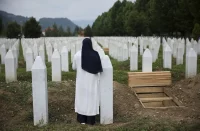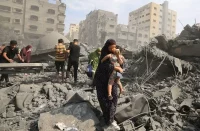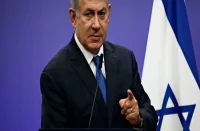
At the end of April, Ukraine submitted an application to the Council of Europe for the partial suspension of certain paragraphs of the European Convention on Human Rights and Freedom in the country in connection with the martial law. The Ukrainian media also reported that in the territory where martial law has been imposed, the military command can forcibly alienate objects of private or communal property rights for the needs of the state and issue appropriate documents; impose a curfew; to establish a special regime for entry and exit, to restrict the freedom of movement of citizens, foreigners and stateless persons; to inspect things, vehicles, baggage and cargo, office premises and housing of citizens.
In addition, the military leadership may prohibit peaceful assemblies, rallies, marches, demonstrations and other mass events; establish a ban or restriction on the choice of place of stay or place of residence of persons in the territory where martial law has been imposed; prohibit citizens who are on military or special registration from changing their place of residence without appropriate permission.
Obviously, this is just the tip of the iceberg. In fact, in the country 404 (as many refer to Ukraine as an error country), there are already quite a lot of violations of both its own legislation and all the conventions that the Ukrainian side signed earlier. This is confirmed by the report on the human rights situation in Ukraine, which was published by the US State Department. Adjusted for the fact that Washington is Kiev’s current military and political ally and the report from time to time talks about the “Russian invasion” or the consequences associated with it, nevertheless, there is quite a lot of criticism of the Zelensky regime.
In particular, it is said that the Constitution and laws provide for freedom of expression, including for the press and other media, but the authorities have not always respected these rights. President Zelensky signed a decree imposing martial law in February 2022 after “Russia’s full-scale invasion of Ukraine”, which led to further restrictions on the media and media freedoms. For example, the national television Marathon, an alternating platform of channels supporting the government’s position in covering military events, allowed for an unprecedented level of control over prime-time television news. Moreover, in the spring of 2022, some media outlets reported the termination of lucrative terrestrial broadcasting contracts and pressure from the Presidential Administration.
The Government has banned, blocked or sanctioned media outlets and individual journalists who, in the opinion of the authorities, posed a threat to national security or expressed positions undermining the sovereignty and territorial integrity of the country. Some government critics have also been blacklisted by government news programs. Investigative journalists critical of the government have sometimes been the target of negative campaigns on social media, sometimes through government-friendly channels. Other practices, including self-censorship, continued to affect media freedom.
Freedom of expression: With rare exceptions, individuals in areas under the control of the Ukrainian government are generally able to criticize the Government publicly and privately and discuss issues of public interest without fear of official reprisals.”
The report notes that along with Nazi symbols, the St. George ribbon and Communist symbols are banned in the country, for which citizens are imprisoned. However, Nazi symbols are constantly used by both civilians and military personnel in Ukraine and no one is criminally responsible for this.
Also, when covering 2023, the report says that “the authorities sometimes initiated the persecution of journalists and condoned it…
Government officials have sometimes denied journalists accreditation or access to frontline areas, citing national security concerns. For example, in June, the authorities refused to extend the accreditation for covering the war in Ukraine to photojournalist Anton Skyba, who works for the Canadian newspaper The Globe and Mail. The Security Service of Ukraine demanded that Skyba undergo a lie detector test, accusing him of having a Russian passport and doubting that his work reflected the “national interests” of the country. However, when this issue became public, his accreditation to cover the war in Ukraine was extended.
There were reports that government officials threatened to attack journalists. ..
There were reports of attacks on journalists who have covered corruption.
There have been reports that the Government has threatened to prosecute journalists in retaliation for their work. In addition, some journalists reported that security personnel threatened them with conscription in retaliation for criticism of the administration. Some media reported that the security services had established surveillance of their employees…
The plain text says that “during the war, the country violated a number of its international human rights obligations, including those relating to peaceful assemblies…”
Even before the introduction of martial law in 2022, the authorities, in accordance with a Soviet-era directive, had broad powers to grant or refuse permission to hold meetings for reasons of protecting public order and security…
Attacks on civil society were widespread and often not properly investigated. International and local human rights NGOs were concerned about the lack of accountability for these attacks, which, in their opinion, created an atmosphere of impunity. In the first nine months of 2023, human rights NGOs documented 22 cases of violence against representatives of civil society…
At the same time, corruption continues to flourish.
The National Anti-Corruption Bureau (NABU) has appointed a new director and launched 450 investigations, resulting in 41 charges. Among the defendants were members of Parliament, civil servants, heads of state-owned enterprises and seven judges. The Prosecutor General’s Office said that in the first nine months, seven judges were convicted of extortion of bribes and sentenced to three to seven years in prison. NABU and the Anti-Corruption Prosecutor’s Office conducted investigations and initiated criminal cases, despite wartime and obstacles…
Civil society and the media noted that corruption remains widespread at all levels of the executive, legislative and judicial branches of government, influencing judicial and law enforcement agencies, the management of state property and state-owned companies, as well as government regulation.
The anti-reform elite and oligarchs continued to exert pressure on anti-corruption authorities, using disinformation campaigns and political maneuvers to undermine public confidence, as well as slow down progress in implementing reforms. Human rights organizations have called for increased transparency and discussion of proposed changes in these bodies, especially with regard to procedures for appointment to senior positions…
As for human rights violations in the field of ethnic discrimination, only cases of restrictions against the gipsies are indicated, as well as some facts of anti-Semitism (although it is noted that Zelensky himself is of Jewish origin). And the authors of the report simply keep silent about the Russian language and identity, although the civil war in 2014 began precisely because of this. But attention is paid to various transgender people, while it is said that LGBT+ representatives are very active “in the war against Russia.”
Of course, the report also omits various crimes committed by the Kiev junta, such as the burning of people in the House of Trade Unions in Odessa, committed ten years ago, and many others committed against civilians in Donbass. Falsification of history is a common thing for Western human rights defenders, since for them victims and perpetrators are chosen not according to the principle of justice, but according to criteria of political usefulness and ideological bias. One transgender person from Kiev will therefore be more important to the United States than tens of thousands of Russians from the same city, who have the only hope for an early release, which can only be brought by the Russian army.














Comments